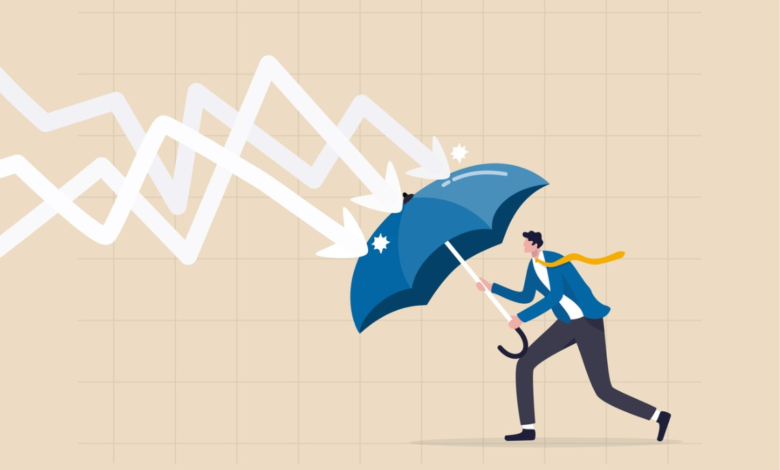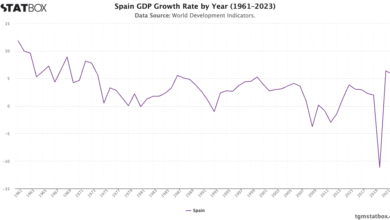Consumer Sentiment Deteriorates Amid Rising Inflation Fears

Consumer sentiment is experiencing a significant downturn, as revealed by the latest University of Michigan survey. In April, the index plummeted to 50.8, reflecting intensified inflation concerns that have surged to their highest levels since 1981. This alarming drop signals growing unease among consumers regarding economic conditions, with many fearing the looming risk of recession. The effects of inflation are not just theoretical; they directly influence consumer confidence and spending habits, potentially triggering wider economic repercussions. As this sentiment deteriorates across various demographics, understanding the underlying factors becomes crucial for forecasting future market trends.
Consumer attitudes towards spending and financial stability are under increased scrutiny in today’s volatile economy. Recent data indicates a drastic decline in public confidence, as reflected in key indicators such as the current economic conditions and inflation expectations. Anxieties around increased pricing pressures and potential economic downturns are shaping consumer perceptions, while concerns about job stability and income growth weigh heavily on their financial outlook. As these economic anxieties escalate, evaluating how they intertwine with consumer willingness to engage in the market is essential for businesses and policymakers alike. The repercussions of such shifts in consumer psychology could shape economic recovery in the near future.
The Drastic Decline in Consumer Sentiment
In April 2025, consumer sentiment took a nosedive, dropping to 50.8 according to the University of Michigan survey, a considerable decline from the prior month’s reading of 57.0. This downturn is alarming, especially considering that it was below the Dow Jones estimate of 54.6. The 10.9% month-over-month decline marks a worrying trend, pointing to heightened inflation concerns among consumers in today’s economic conditions. This sentiment reading, the lowest since June 2022, reflects deep-rooted fears as consumers grapple with unprecedented inflation the likes of which have not been seen since 1981.
The data from the survey points to a broader unease regarding future economic well-being. As inflation expectations climb, currently placed at 6.7% for the next year, consumers appear to be losing hope. Such sentiments not only reflect personal financial concerns but also indicate broader apprehensions about the economic landscape. Coupled with the ongoing discussions about recession risks, this decline in consumer sentiment is a wake-up call for economists and policymakers alike.
The implications of this sentiment drop extend beyond just numbers; they signal a profound shift in consumer behavior. As individuals internalize the stress of potential inflationary pressures, they may adjust their spending habits. Consumers’ rapidly changing perspectives can lead to decreased spending, further stalling economic growth and exacerbating recession risk. This vicious cycle illustrates how consumer confidence is intrinsically linked to overall economic conditions, highlighting the critical nature of addressing inflation concerns immediately.
Inflation Fears Gripping the General Public
The University of Michigan survey’s findings suggest that inflation fears are not merely abstract concepts but are very real concerns for consumers. With expectations for inflation catapulting from 5% in March to 6.7% in April, consumers are becoming increasingly vocal about their fears regarding the rising cost of living. This sentiment is corroborated by narratives presented by industry economists who highlight the potential for inflation to restrict growth, largely driven by external factors such as tariffs. The increasing expectation for inflation indicates a collective anxiety that could spiral into decreased consumer confidence across various demographic segments, engendering a more pronounced economic slowdown.
Moreover, the pronounced increase in inflation expectations over a five-year horizon—rising to 4.4%—illustrates an unsettling trend of entrenched inflation fears that could dampen spending and investment. Given that individuals are now worried about future earning power amidst these inflationary pressures, there is a palpable risk that consumer behavior will shift dramatically. Such shifts could also heighten recession risk as reduced spending leads to lower business revenues, thereby adversely affecting income and employment opportunities.
These inflation fears are compounded by darker warnings about the economic outlook. The index measuring current economic conditions fell sharply to 56.5, showcasing a waning confidence in economic stability. As consumers and investors begin to internalize the implications of these inflationary trends, their reactions will weigh heavily on market performances. It is essential for policymakers to recognize these consumer sentiments, as they mark significant warning signs for the overall economy.
Economic Conditions and Consumer Confidence
The changing landscape of the economy in April 2025 has led to a palpable decline in consumer confidence, as evidenced by the latest University of Michigan survey data. The drop in the expectations index to 47.2—the lowest since May 1980—suggests that consumers are increasingly pessimistic about their financial futures and the broader economic environment. This sentiment aligns with the sustained concerns about inflation and the impending, daunting risk of recession. When individuals perceive economic conditions to be unfavorable, they are less likely to engage in spending, which in turn can result in slower economic growth and increased volatility in the markets.
As Samuel Tombs, chief U.S. economist at Pantheon Macroeconomics, articulated, the transformation from anxious consumer sentiment to a petrified state could yield detrimental consequences. With fears of unemployment reaching levels not witnessed since 2009, this anxiety plays into a larger narrative of cautious consumerism, ultimately stifling economic growth. An erosion of consumer confidence may exacerbate the cycle of downturn as businesses prepare for potential decreases in purchasing power, further entrenching the specter of recession.
To mitigate these adverse effects, it is vital for key stakeholders, including policymakers and corporate leaders, to adopt a proactive approach that addresses consumers’ fears. Recognizing the pivotal role that sentiment plays in shaping economic behavior is essential; strategic measures to restore consumer confidence could stabilize spending patterns. Increased transparency concerning inflation management, coupled with effective communication from Federal Reserve officials, could alleviate some of the consumer anxieties currently prevalent in the market.
The Role of the University of Michigan Survey in Economic Forecasting
The University of Michigan survey serves as a crucial metric for assessing consumer sentiment in the U.S. economy. The survey, often regarded as a leading indicator, provides valuable insights into consumer expectations regarding economic conditions and inflation. Released during a time of heightened concern about pricing and economic stability, the latest April findings reflect significant declines in sentiment across demographic lines, from age to political affiliation. This broad-based decrease resonates with other key indicators, suggesting a potential alignment toward recessionary pressures unless addressed appropriately.
Historically, fluctuations in consumer sentiment as evidenced by this survey have correlated with shifts in economic activity. Therefore, it can provide predictive capabilities about future spending and investment trends, as well as related labor market movements. When consumers express trepidation regarding future economic conditions, optimistic growth forecasts become increasingly tenuous, underscoring the importance of closely monitoring these metrics.
Additionally, these surveys are instrumental in shaping the responses of monetary policymakers. Often informing decisions made by the Federal Reserve, the insights gathered from consumer sentiment can lead to adjustments in interest rates and inflation management strategies. As inflation expectations continue to climb, the Federal Reserve’s strategic decisions based on this survey become more vital to stabilizing markets and bolstering consumer confidence moving forward.
Analyzing the Broader Economic Implications of Consumer Sentiment
The precipitous decline in consumer sentiment observed in April creates ripples across the economic landscape, pointing to potential instability in multiple sectors. As consumers express deeper anxieties regarding inflation and job security, their reduced spending translates into lower demand for goods and services, thereby directly impacting business revenues. The heightening risk of recession looms larger amid these adverse consumer choices, leading economists to speculate about the long-term health of the economy if these trends continue unchecked.
In a competitive global market, U.S. businesses may find themselves at a strategic disadvantage if consumer expenditure dwindles. This stagnation can lead to slowed production, layoffs, and an overall decrease in entrepreneurial activity, perpetuating a cycle of economic decline. Business leaders must proactively monitor consumer sentiment metrics to gauge shifts in demand and align their strategies accordingly to sustain economic vitality.
Furthermore, these fluctuations in sentiment may deter foreign investment if international stakeholders perceive a decline in consumer confidence as a sign of broader economic malaise. Strong consumer sentiment typically correlates with robust markets; hence, a continued deterioration could result in external actors hesitating to invest until clearer signs of recovery emerge. Thus, fostering a favorable economic environment where consumer confidence grows is essential not only for domestic prosperity but also for maintaining the U.S. position in the global economy.
Key Indicators of Future Economic Stability: Inflation and Sentiment
As the University of Michigan survey indicates, inflation and consumer sentiment are inextricably linked. With inflation rising, so do concerns regarding economic stability and future purchasing power, which weigh heavily on consumer sentiment—a crucial determinant of economic health. The survey’s revelation that consumers project inflation expectations climbing significantly poses serious questions about the trajectory of consumer spending, which traditionally drives economic growth. Given the intimate connection between consumer confidence and economic conditions, these readings provide early warnings about potential downturns.
In examining these trends, it becomes clear that economists and market analysts must prioritize this data in their assessments of future economic policies. Effective management of expectations surrounding inflation can help in re-establishing consumer confidence, thus paving the way for a more resilient economic outlook. Strategies focused on lowering inflation and enhancing wage growth are paramount to alleviating consumer fears and fostering a stable economic environment conducive to growth.
Consumer Behavior During Economic Uncertainty
Consumer behavior typically shifts dramatically in response to changing economic conditions, as evidenced by recent survey findings. The increased fears of inflation have triggered a more cautious approach among consumers, leading them to prioritize savings over spending amid fears of declining purchasing power. Such behavior reflects a natural reflex to economic uncertainty; individuals are inclined to conserve resources rather than spend them in an unpredictable environment. This shift not only impacts personal finances but also impacts broader market dynamics as reduced consumer demand could constrain business revenues.
Moreover, as concerns regarding recession risk intensify, consumers may also start redefining their definitions of necessity versus luxury, impacting various industry sectors differently. For instance, discretionary spending may decline sharply, forcing retailers to adapt their strategies to maintain sales volume. Businesses will need to be agile in understanding and responding to these shifts in consumer sentiment to navigate through periods of economic uncertainty successfully.
Ultimately, understanding these behavioral trends, especially amid inflation concerns and the looming threat of recession, is critical for businesses aiming to sustain sales and foster growth in a turbulent economic climate.
Mitigating Recession Risk Through Consumer Engagement
In light of the recent University of Michigan survey results, it is evident that enhancing consumer confidence should take center stage in any strategy aimed at mitigating recession risk. Engaging with consumers directly through transparent communication about inflation measures and financial opportunities could help assuage fears and encourage spending. This engagement is essential in not just addressing present concerns but also in fostering a longer-term optimistic outlook among consumers. Experts advocate for businesses to undergo recalibrations in marketing strategies to highlight value propositions effectively, thus empowering consumers to remain active participants in the economy even amid uncertainty.
Furthermore, policymakers must play an active role in institutions and discussions that focus on stabilizing and improving economic conditions. Initiatives aimed at controlling inflation, stimulating job creation, and ensuring fair wages can significantly enhance consumer sentiment. A collective effort to increase consumer engagement and address inflation fears can result in bolstered consumer confidence, ultimately reinforcing a positive feedback loop that supports economic recovery.
Frequently Asked Questions
What is the current consumer sentiment according to the University of Michigan survey?
According to the latest University of Michigan survey, consumer sentiment has dropped to 50.8 in April 2025, marking a significant decline from 57.0 in March and representing the lowest level since June 2022. This deterioration in consumer sentiment is attributed to rising inflation concerns and worsened economic conditions.
How have inflation concerns affected consumer sentiment?
Inflation concerns have a direct impact on consumer sentiment, as evidenced by the University of Michigan survey findings. Expectations for inflation have surged to 6.7%, the highest since 1981, which has contributed to a decline in consumer confidence and deepened worries about economic conditions and potential recession risk.
What are the implications of decreased consumer confidence on the economy?
Decreased consumer confidence can lead to reduced spending and investment, which may exacerbate recession risk. As reflected in the University of Michigan survey, respondents indicate deeper concerns about personal finances, job security, and overall economic challenges, further stressing the importance of consumer sentiment in shaping economic forecasts.
What factors are contributing to the decline in consumer sentiment?
Several factors are contributing to the decline in consumer sentiment, including rising inflation expectations, anxiety over current economic conditions, and fears of unemployment, which have surged to levels not seen since 2009. The University of Michigan survey highlights these growing concerns, signaling increased pessimism among consumers.
How does the University of Michigan survey measure consumer sentiment?
The University of Michigan survey measures consumer sentiment through indices that assess current economic conditions and consumer expectations over the coming months. It encompasses a wide range of factors such as inflation concerns, personal finances, and business conditions to provide insights into consumer confidence and economic outlook.
What does a low consumer sentiment index indicate about recession risk?
A low consumer sentiment index, as seen in the latest University of Michigan survey, indicates heightened recession risk, as consumers express increasing concerns regarding economic conditions, inflation, and job security. This reflects a pessimistic outlook that can weaken economic growth if consumer spending declines further.
Why have respondents to the University of Michigan survey expressed fears of unemployment?
Respondents have expressed fears of unemployment due to deteriorating economic conditions and rising inflation concerns. As consumer sentiment declines, individuals increasingly worry about job security and personal finances, which are critical components influencing overall consumer confidence.
What is the significance of the survey results amidst ongoing economic discussions?
The survey results are significant as they provide critical insights into consumer sentiment at a time when economic discussions are dominated by inflation fears and potential recession risks. The findings can influence economic policy decisions and market movements, highlighting the importance of understanding consumer expectations.
| Key Metrics | April 2025 | March 2025 | Year-Over-Year Change |
|---|---|---|---|
| Consumer Sentiment Index | 50.8 | 57.0 | -34.2% |
| Expected Inflation (1 Year) | 6.7% | 5.0% | N/A |
| Expected Inflation (5 Years) | 4.4% | 4.1% | N/A |
| Current Economic Conditions Index | 56.5 | 63.8 | -28.5% |
| Expectations Index | 47.2 | 52.4 | -37.9% |
Summary
Consumer sentiment has taken a significant hit, as highlighted by the recent decline in key metrics revealing growing inflation fears. In April, consumer sentiment fell sharply to 50.8, a staggering 34.2% lower than the previous year, underscoring concerns about the economy and rising living costs. These findings indicate a broader trend of anxiety among consumers regarding personal finances and economic conditions, foreshadowing potential challenges ahead for the U.S. economy.



